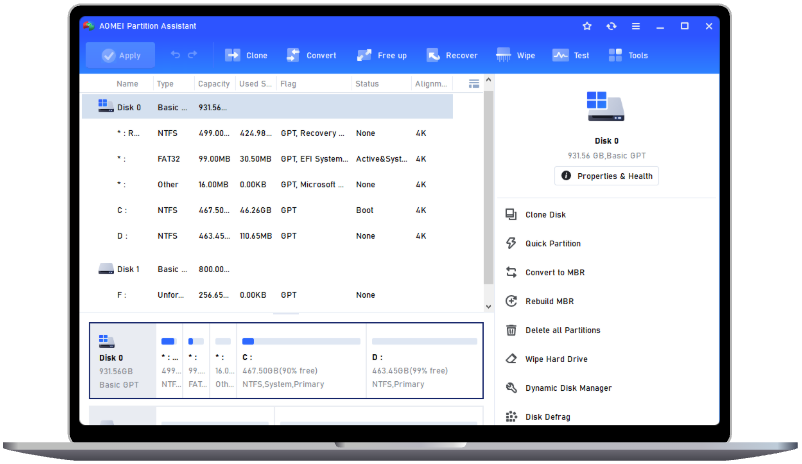Stepwise Tutorial: Replace Hard Drive ASUS Desktop
If your ASUS computer is starting to run slow, one of the best ways is to change a new hard drive. This guide will walk you through the steps to replace hard drive ASUS desktop by using AOMEI disk cloning software.
Is it worth replacing computer hard drive?
Is it worth replacing hard drive Asus desktop? This is a question that often comes to mind when many people are considering replacing their Asus hard drive and the answer is yes. If you happen to own an Asus PC that has seen better days than a few years ago, now is the time to consider the prospect of introducing a new hard drive. This shift is expected to bring many benefits, including increased speeds, increased storage capacity and enhanced reliability compared to aging existing technologies.
Preparations for replacement hard drive for ASUS laptop
To ensure a seamless ASUS desktop hard drive replacement, thorough preparation measures must be taken.
▶ Choose hard drives for ASUS desktop
The first step in this effort is ensuring the replacement drive's compatibility with the Asus desktop. You have two viable options. First, you can repurpose a previously used drive, provided it has a higher storage capacity than the original drive. Alternatively, you can choose to purchase the original hard drive.
If you're not sure which drive should be your Asus computer's new companion, consider choosing a solid-state drive (SSD) wisely. This option has many advantages when juxtaposed with traditional hard drives. So, if your budget allows, it would be wise to replace ASUS laptop hard drive with SSD.
In a range of cost-effective SSDs known for their high performance, notable contenders like the Crucial P5 Plus, WD Blue 3D NAND, Samsung 870 EVO, and Samsung 980 PRO deserve to be on your consideration list.
▶ Decide the ASUS hard drive replacement method
In fact, the process of replacement hard drive for Asus laptop becomes manageable when you choose the appropriate replacement method. Generally, you can use two different methods:
1. Fresh Installation: In this method, you first replace the hard drive and then install the operating system on the new hard drive. This results in a pristine operating system environment but requires the arduous task of re-downloading and reinstalling all programs on the PC.
2. Disk Cloning: Another method is to clone the HDD to SSD before performing a physical hard drive replacement. This technology enables a direct copy of everything from the old drive to the new drive, including the operating system, system files, drivers, installed applications, and your valuable personal data.
Among the above two methods, it’s known that reinstalling Windows, while sometimes necessary in cases of hard drive or operating system corruption, can be a time-consuming and arduous task. Besides, it inevitably leads to permanent loss of installed programs and personal data, making it an unfavorable option.
So, if you find yourself in need of replacing your Asus hard drive but are unwilling to lose your data, it would be wise to make the disk cloning method your first choice.
▶ Select reliable disk cloning software
Once you've decided on disk cloning as your preferred method for hard drive replacement, choosing reliable disk cloning software becomes crucial to ensuring a quick and efficient transition. The market is flooded with options, but not all software is created equal. Here are some important considerations to guide your selection process:
Easy to use: Choose software that provides a user-friendly experience from installation to execution, freeing you from tedious instructions.
Compatibility: Verify that the software matches your desktop's operating system seamlessly to prevent potential future compatibility issues.
Speed: In the world of hard drive replacement, time is of the essence. Prioritize software with flexible and efficient processes.
Considering these important factors, we recommend you use AOMEI Partition Assistant Professional as your first choice tool to replace Asus laptop hard drive with SSD. This disk cloning software not only includes the above attributes but also excels in transitioning from HDD to SSD. It cleverly facilitates operating system migration without data loss or operating system reinstallation, simplifying your hard drive replacement.
How to replace hard drive ASUS desktop - detailed steps
Now, let's delve into the step-by-step process of replacing the hard drive on your ASUS desktop:
Step 1. Install and launch AOMEI Partition Assistant, click "Clone" in the main interface and select "Clone Disk".
Step 2. Choose the hard disk that you need to clone as the source disk and click "Next".
Step 3. Select the destination disk to store the data on the source disk, and then click "Next".
Step 4. Then, you can check the source and destination disk in the next window or change to “Sector to Sector clone”, and click the "Confirm" button to continue if there is no problem.
Here, you can also click the "Settings" button to adjust the partition size on the destination disk or tick "4k alignment" to improve the reading and writing speed of SSD if the target disk is an SSD drive.
Step 5. At last, click "Apply" and "Proceed" in the main interface to start cloning the hard drive.
Conclusion
That’s all about how to replace hard drive Asus desktop. This upgrade can really breathe new life into an aging desktop, and the process is surprisingly easy and quick, especially with the help of AOMEI Partition Assistant Professional. This practical and efficient tool is your ally in ASUS desktop hard drive replacement, ensuring a seamless transition to higher performance and storage capacity.


